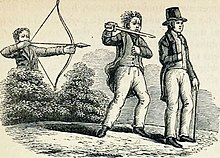
Backbiting or tale-bearing is to slander someone in their absence — to bite them behind their back. Originally, backbiting referred to an unsporting attack from the rear in the blood sport of bearbaiting.
Causes
Backbiting may occur as a form of release after a confrontation. By insulting the opposing person, the backbiter diminishes them and, by doing so, restores their own self-esteem. A bond may also be established with the confidante if they are receptive to the hostile comment. Such gossip is common in human society as people seek to divert blame and establish their place in the dominance hierarchy. But the backbiting may be perceived as a form of delinquent behaviour due to an inferiority complex.
Religious views
In most major religions, backbiting is considered a sin. Leaders of the Baháʼí Faith condemned it as the worst of sins as it destroyed the 'life of the soul' and provoked divine wrath. In Buddhism, backbiting goes against the ideal of right speech. Saint Thomas Aquinas classified it as a mortal sin, given that, as with other mortal sins, the act attains its perfection, that is, the act is committed with full knowledge and full consent of the will. Islam considers ghibah, or backbiting, to be a major sin and the Qur'an compares it to the abhorrent act of eating the flesh of one's dead brother. Additionally, it is not permissible for one to keep quiet and listen to backbiting. In Judaism, backbiting is known as hotzaat shem ra (spreading a bad name) and is considered a severe sin.
in the 19th century, Charlotte Elizabeth wrote an account of backbiting for the moral education of children in places such as Sunday school.
Notable examples
In the Book of Numbers, the elder siblings of Moses – Miriam and Aaron – talk against him together. God is angered and punishes Miriam with leprosy.
Gordon Brown notoriously spoke of Gillian Duffy as being a "sort of bigoted woman" after conversing with her pleasantly during his 2010 election campaign. This remark was made to his staff as he was driving away but was picked up by a live microphone. This incident caused him great embarrassment and he returned to apologise, declaring that he was a "penitent sinner."
References
- William Holmes (1868), Religious Emblems and Allegories : a series of engravings, with suitable letter-press, designed to illustrate divine truth, London: William Tegg, p. 98
- Webb B. Garrison (2007), "To Backbite", Why You Say It, Read Books, p. 166, ISBN 9781406776195
- ^ Geoff Beattie (29 April 2010), Brown's 'bigot' remark: It's that sinking feeling, BBC
- "Psychology of Backbiting", The Educational Review, 70–71: 195, 1964
- Peter Smith (2008), An introduction to the Baha'i faith, Cambridge University Press, p. 156, ISBN 9780521862516
- Jootla, Susan (1982), "Right Livelihood: The Noble Eightfold Path in the Working Life", The Wheel, Buddhist Publication Society
- Aquinas, Thomas. "Summa Theologiae: Backbiting (Secunda Secundae Partis, Q. 73)". New Advent.
- "Catechism of the Catholic Church - Part Three - Section One - Chapter One - Article 8: Sin. St. Charles Borromeo Catholic Church".
- Rafik Berjak (2006), "Backbiting", in Oliver Leaman (ed.), The Qur'an: an encyclopedia, Taylor & Francis, p. 106, ISBN 9780415326391
- Abdullah, Mohammed (2006). The reliance of the believer in Ramadhan. Singapore: Squiz D.sign. ISBN 9789810565497.
- Charlotte Elizabeth (1842), Backbiting, New-York Sunday School and Juvenile Book Depository: John S. Taylor & Company
- Tom Hale; Steve Thorson (2012), Applied Old Testament Commentary, David C Cook, p. 353, ISBN 9781434766434
- Patrick Wintour, Polly Curtis (28 April 2010), "Gordon Brown 'penitent' after bigot gaffe torpedoes election campaign", The Guardian